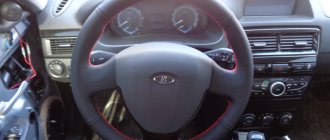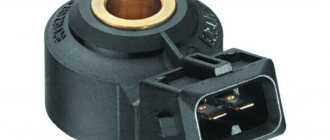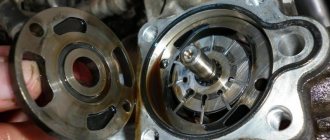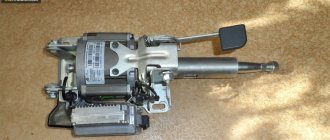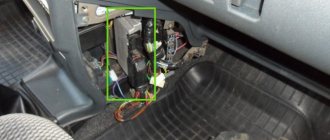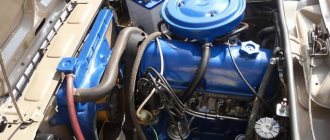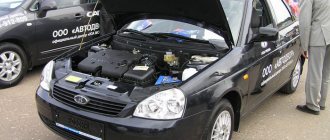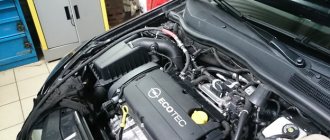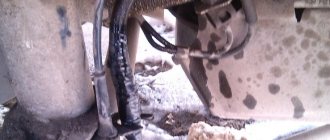EUR - what is it?
Electric power steering is a kind of electric motor that helps the driver turn the steering wheel with less effort. The EUR is installed on the steering wheel shaft and, when the engine is running, helps to rotate the steering wheel, powered by electrical voltage.
The main task of the ESD in a car is to reduce the force of rotation of the steering wheel by the car driver.
What it consists of:
- Steering shaft;
- Torsion shaft;
- Electrical engine;
- EUR control unit;
- Motor rotor sensor;
- Torque sensor;
- Circuit breakers;
The components of the EUR include the following elements:
- Steering rack;
- Steering wheel;
- Speed sensor;
- Steering cardans;
All these details directly affect the operation of the electric power steering of the Lada Priora.
Device
The main components of the EUR are:
- electrical part;
- mechanical;
- controller and peripherals.
The first category includes, in particular, the electric motor.
The mechanical part consists of:
- steering wheel parts;
- connections;
- input and output shafts;
- bracket;
- tilt adjustment lever;
- studs, bolts, nuts, etc.
This also includes the steering rack.
As practice has shown, most often it is electronic devices that fail, that is, ECUs, sensors and the distribution terminals connecting them.
Priora EUR control unit
This part serves to calculate the force applied to the steering wheel and the force that the electric motor applies to the steering wheel shaft. The block is also responsible for turning off the power steering at speeds above 100 km/h for a more sensitive understanding of the car.
The EUR control unit on the Lada Priora is located near the power steering electric motor on a special bracket.
Problems in the operation of the hydraulic booster
All breakdowns of the Priora power steering, as well as the causes and methods of eliminating them, are listed in the table:
| Malfunction | Cause | Remedy |
| When turning the steering wheel, you feel a kickback (shocks in the opposite direction) | Worn or loose pump drive belt | Replacing or adjusting belt tension |
| It takes a lot of effort to turn the steering wheel. | The pump belt is worn or loose. Low fluid level in the reservoir. The fluid reservoir filter is clogged. Low pump pressure or air lock in the system. Insufficient engine idle speed. | Adjust or replace the drive belt. Add liquid to the reservoir. Replace or clean the filter. Replace the pump. Remove the air lock. Adjust idle speed. |
| More effort is required to rotate the steering wheel in the middle position | Pump or steering mechanism faulty | Check, repair or replace the pump. Find and fix the steering mechanism problem |
| More effort is required to turn the steering wheel to one side | The pump has failed | Pump repair or replacement |
| Steering is unclear | There is not enough fluid in the reservoir or it is leaking. Air in the power steering system. Resource development. | Add fluid and fix leaks if any. Remove the air lock. Check steering components and replace if necessary. Replace tires. |
| It takes a lot of physical effort to quickly turn the steering wheel | The belt tension has weakened. Air in the system. The pump is faulty. Failure of parts of the steering mechanism. Floating idle speed. | Pull the belt. Remove the air lock. Replace the pump if it cannot be repaired. Check and eliminate faulty parts of the steering mechanism. Adjust idle speed. |
| Noise during power steering operation | There is not enough liquid in the tank. The liquid is discharged through the safety valve (a whistle is heard when the steering wheel is turned to the extreme position). | Add fluid and fix the leak. Remove the air lock. Check the pump pressure, repair or replace the part. |
| Steering wheel vibration | Airlock. The wheels are out of balance or the tires are damaged. | Remove air. Balance wheels or replace tires |
In practical terms, power steering is more often replaced with a new one or with a known good one. The original device costs a lot, so they choose analogues. Models from Chinese manufacturers have proven themselves to be an inexpensive option of good quality.
Differences between EUR and power steering
The electric amplifier differs from the hydraulic one in the absence of fluid and the pump necessary to pump this fluid. Also, the hydraulic power steering operates entirely on mechanics, unlike the electric power steering, in which mechanics are involved only in the rack and steering wheel. EUR is much simpler and easier to maintain, but in terms of repairs it is much more expensive.
Advantages and disadvantages of EUR over power steering
Although the EUR is more modern and technologically advanced, it has both advantages and disadvantages over the power steering.
Advantages:
- The simplest design that does not require constant monitoring of the liquid level (dixtron);
- There is no need to service the power steering pump, since it simply does not exist;
- Reduction of force with increasing vehicle speed;
- Ability to programmatically adjust steering wheel force;
- Reliability of the design;
- Compact, no bulky pump in the engine compartment and no extra hoses;
- The simplicity of the steering rack and its reliability, since it is dry and there is simply nothing to leak in it (everyone knows very well about the disease of “wet” racks);
Flaws:
- High power consumption, at some points the electric power steering can take up to 40% of the electrical power of the car’s generator and cause voltage drops in the on-board network;
- Possibility of overheating of the electric motor when driving on a dirt road (track) up to the complete shutdown of the power steering;
As you can see, the more modern power steering has many more advantages, which is why it is gaining great popularity among cars at the present time.
Malfunctions
On the mechanical side, shafts, fittings or connecting parts usually fail. In this situation, when the steering wheel is rotated, the wheels remain stationary. In general, everything is repaired here quite simply - by replacing parts that have become unusable.
A breakdown of an electric motor usually requires the purchase of a new one, since it cannot be restored. A new unit is sold in any large store, and it is not difficult to install it on your own.
When it turns out that there is a break in the connection between the controller and the EUR, it is necessary to inspect the connectors. In this case, attention is paid to the second of them (the first, as previously noted, is power). You need to climb there if there are no signals from the camshaft and crankshaft sensors. If the wiring is frayed or its insulation is broken, the entire harness will have to be replaced. It is sold separately and is inexpensive. Otherwise, you will need to check all contacts and “ring” them with a multimeter.
Sensors are checked by replacing them with known working ones. A faulty controller cannot be repaired, so you will need to purchase a new one.
Technical characteristics of the EUR
| Name | Index |
| Rated voltage, (V) | 13,5 |
| Operating voltage, (V) | 10-15 |
| Maximum current, (A) | 55 |
| Current at rest, (A) | 0,5 |
| Moment of resistance at rest, (Nm) | 0,8 |
| Weight, (kg) | 9,3 |
| Operating temperature, (⁰С) | -40…65 |
How to check and replace a fuse or relay
Before replacing a faulty fuse, it is necessary to perform diagnostics according to the following principle:
- Verify that the consumer is actually not running.
- Find the appropriate fuse in the table.
- Take it out and check the condition of the fusible part.
- If it is impossible to verify the integrity of the thread, test it with a multimeter.
- The presence of a break when testing two contacts indicates a burnt-out insert.
In this case, you should re-install a new fuse and try to use the consumer.
If the insert burns out again, re-installation of a new insert is prohibited! It is necessary to check the equipment circuit for a short circuit.
The relay is easier to check - the absence of clicks from its side may indicate problems in the circuit or a malfunction of the relay itself.
It is enough to pull it out and install in its place any other adjacent one with a similar rating and contacts. If installing a new relay fixes the problem, then that was the problem.
Removal and installation
To carry out work on removing and installing the electric power steering on a Priora, you need to prepare a special tool that will be needed during the work process.
You will need:
- Hammer;
- Wedge (a chisel will do);
- Ratchet;
- Ratchet extension;
- Head for “8” and “13” mm;
After preparing the tool, you can begin to work.
Removal
- Disable the mass mark from the battery;
- dismantle the steering column casing;
- Remove the ignition switch by unscrewing the bolts;
- Remove all connectors from the power steering unit;
- We unscrew the steering cardan nut and use a wedge to loosen its engagement on the splines;
- Unscrew the nuts securing the amplifier to the body (4 pcs);
- We remove the structure from the car;
- We assemble in the reverse order;
Description and purpose of fuses in the interior of the Lada Priora
The salon unit is the main one. It is from him that all other consumers disperse throughout the body. Depending on the configuration, fuses and relays may have different purposes. Everything is described in more detail in the tables.
Cabin fuses table:
| Number | Denomination | Standard/norm | Standard + air conditioning/Lux |
| F1 | 25 | Cooling Fan | Spare |
| F2 | 25 | Heated rear window | Power supply for the heated glass relay, power accessories control unit, rear window heating element, power supply for the mounting block |
| F3 | 10 | High beam of the right headlight | High beam of the right headlight, instrument panel, high beam indicator on the dashboard |
| F4 | 10 | Main beam of the left block headlight | Main beam of the left block headlight |
| F5 | 10 | Klaxon | Power supply for the horn relay, power supply for the mounting block, activation of the alarm signal of the standard security system |
| F6 | 7,5 | Low beam of the left headlight | Low beam of the left headlight |
| F7 | 7,5 | Low beam of the right headlight | Low beam of the right headlight |
| F8 | 10 | OEM alarm | Mounting block power supply, standard alarm signal |
| F9 | 25 | Heater | Spare |
| F10 | 7.5 or 10 | Interior lamp, instrument panel lighting, brake light | Instrument panel, brake light limit switch, brake lamps, interior lighting, additional brake light |
| F11 | 10 or 20 | Wiper motor | Mounting block power supply, windshield wiper, rear window heating button, rear window wiper, airbag control unit |
| F12 | 20/10 | "Plus" after the ignition switch | Instrument panel, power accessories ECU, electromechanical power steering ECU, reverse lamp limit switch, standard parking sensors control unit |
| F13 | 15 | Cigarette lighter | Cigarette lighter |
| F14 | 5 | Left headlight size, license plate and trunk lighting | Side light on the left side, instrument panel, light on indicator, license plate and trunk light, power accessories ECU |
| F15 | 5 | Side light of the right block headlight | Side light on starboard side, glove compartment lamp |
| F16 | 10 | ABS power supply | ABS power supply |
| F17 | 10 | Left PTF | Left PTF |
| F18 | 10 | Right PTF | Right PTF |
| F19 | 15 | Seat heating | Seat heating switch, heating elements |
| F20 | 5 or 10 | Immobilizer | Interior air recirculation switch and indicator, power supply for mounting block, low beam and headlight relay, power supply for heater fan relay, windshield wiper ECU, climate control ECU, light and rain sensor |
| F21 | 7.5 or 5 | Rear PTF | Hazard warning lights, climate control ECU, diagnostic power supply |
| F22 | 20 | Spare | Wiper Motor - Automatic Wiper Mode, Mounting Unit Power, Wiper High Speed Relay Power |
| F23 | 7,5 | Spare | Windshield wiper control unit |
| F24 | — | From 24 to 30 Reserve | From 24 to 30 Reserve |
| F25 | — | — | — |
| F26 | — | — | — |
| F27 | — | — | — |
| F28 | — | — | — |
| F29 | — | — | — |
| F30 | — | — | — |
| F31 | 30 | Electrical package control unit | Electrical package control unit |
| F32 | — | Spare | Spare |
Relay table:
| Relay number | Designation |
| K1 | Electric cooling fan (Normal) or low beam (LUX version) |
| K2 | Heated glass |
| K3 | Starter relay |
| K4 | Ignition relay |
| K5 | Reserve |
| K6 | Washer and wiper relay |
| K7 | High beam relay |
| K8 | Sound signal |
| K9 | OEM alarm |
| K10 | PTF relay |
| K11 | Seat heating |
| K12 | Spare |
To power the engine ECU circuits, a small block of fuse links and relays are also placed in the cabin under the dashboard in the central part of the cabin.
Additional mounting block table:
| Name | Denomination | Designation |
| Fuse F1 | 15 | Main relay and starter interlock power supply |
| Fuse F2 | 7,5 | ECU power supply |
| Fuse F3 | 15 | Fuel pump power |
| Relay K1 | — | Main relay |
| Relay K2 | — | Fuel pump relay |
The inserts in this block burn out less often, but the relays very often fail. Therefore, if there is a problem with the fuel pump, you should look here first.
Do-it-yourself electric power steering repair on a Priora
Modern car models are radically different from their predecessors. Changes can be seen in everything. However, one of the most significant achievements has been easier vehicle control. If previously you had to put a lot of effort into turning the steering wheel, now everything is much simpler. Moreover, you can turn the steering wheel with almost one hand when the car is turned off. All this thanks to the installed EUR. But sometimes it happens that the power steering on the Priora does not work.
With the help of this device, the force required to rotate the steering wheel is reduced significantly. In other words, you can safely operate it with one hand without unnecessary stress.
On older models of VAZ cars, a different system was installed - hydraulic boosting, but starting with Kalina, manufacturers switched to electric power steering, which pleasantly pleased buyers. The shortcomings that the EUR has are completely eliminated in the new model. If it breaks down, the device can be repaired much easier. But there are also disadvantages.
The EUR has the following three main components:
- mechanical;
- electric;
- ECU with peripherals.
The mechanics include the steering control parts and the parts that connect the entire mechanism. This also includes fittings that act as fasteners.
The “electrical component” category includes the amplifier motor - the weakest part, which is most often subject to breakdowns. There are also connectors for sensors and ECUs.
We determine the operating condition of the EUR by the light on the device
Every time you get into a car and turn the ignition key, you should pay attention to the panel - an icon in the form of a steering wheel and an exclamation mark. When the ignition is turned on, it lights up and if the entire system is in working order, then after a few minutes it automatically goes out
If it continues to glow, it is a clear sign of failure.
In this case, diagnostics should be carried out using computer technology.
It is important to obtain fault codes and decipher them. Sometimes only codes are provided
It is worth remembering a simple rule - all faults associated with the electric power steering are given by numerical combinations starting with the letter “C”
Please note - the value “C 1013” indicates a low voltage, which is not enough for the full and safe operation of the electric amplifier
There may be more than one reason for this malfunction. The most common is the breakdown of a pair of wires (or one). They may not function due to weakening or burning. They are very easy to find by color - red and black. The second problem is the large fuse on the device. It can be easily replaced or repaired. And the third is the lack of network in the car. It is almost impossible to fix this problem on your own; contact a specialist.
We find out the operating condition of the electric booster using the steering wheel
A common reason for checking is that the light indicating the EUR is not on.
It is important to pay attention to the technical condition after a major overhaul. This is done easily: without starting the car, turn the steering wheel. Then start the engine and do the same action
If the applied force was the same, this means the following - the EUR does not work in Priority
Then start the engine and do the same action. If the applied force was the same, this means the following - the EUR does not work in Priority.
The cause of the malfunction may be the operation of one of three components. Mechanical problems indicate that the shaft, connections or fittings are not working properly. If this is the problem, the wheels simply do not obey the steering wheel turns. If the problem is not mechanical, the work will be larger and more complex. If the servomotor or amplifier breaks down, you can forget about repairs. It’s better to buy a new EUR and install it yourself - it will be faster, cheaper, more practical and reliable. And the last option that could cause a breakdown is a faulty wire. These are very important components that transmit signals from external sensors. This case can also be easily repaired at home; it is enough to initially purchase electrical wiring and carry out installation.
